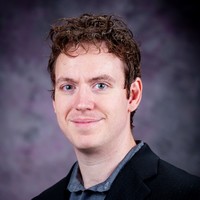
David E. Thompson
- Courses3
- Reviews4
- School: Kansas State University
- Campus:
- Department: Electrical Engineering
- Email address: Join to see
- Phone: Join to see
-
Location:
Kansas State University
Manhattan, KS - 66506 - Dates at Kansas State University: September 2016 - April 2018
- Office Hours: Join to see
Biography
Kansas State University - Electrical Engineering
Assistant Professor at Kansas State University
Biotechnology
David
Thompson
Manhattan, Kansas
Educator, scientist, and lover of numbers.
Experience
University of Michigan
Post-doctoral fellow
• Developed hardware and firmware for an implantable neural recording device.
• Designed test circuits for a variety of candidate amplifier chips.
• Assisted in the lab build for a new professor, including the development of a real-time timing and analysis platform.
• Trained undergraduates and graduate students in tasks ranging from data analysis to soldering and board layout.University of Michigan
Ph.D. Candidate / Graduate Student Research Assistant
• Developed hardware, firmware, and software for a Multi-Purpose Brain-Computer Interface (BCI) Output Device, capable of translating BCI signals into physical switch closures or USB keyboard or mouse commands.
• Performed large-scale offline analysis of BCI data, including writing MATLAB code and interfacing with a cloud computing cluster.
• Designed and piloted research studies.
• Collected EEG data from human subjects and participated in IRB approval process.
• Performed statistical analyses and authored papers (see publications).
• Began collaboration with an international research lab in Berlin, Germany.Kansas State University
Assistant Professor
David worked at Kansas State University as a Assistant Professor
Kansas State University
Undergraduate Research Assistant - Electrical Engineering
• Designed and tested a prototype PIC-based pulse oximeter unit, providing order-of-magnitude improvements in resolution over the previous model.
• Created a second version (based on a SiLabs C8051F411) as a SMT-based PCB layout, coordinated board fabrication and population.Allen Community College
Adjunct Instructor
• Taught two semesters of Principles of Biology (online).
• Proofread and modified existing course.
• Developed rubrics for scoring assignments and posted for student review.
• Utilized email and online tools such as Blackboard to communicate with students.Tohoku University
Foreign Guest Researcher, Tadokoro Laboratory
• Developed C++ control algorithms for a tactile stimulus device for MRI use.
• Wrote MATLAB code to handle synchronization between motor control and MRI machine and to allow end-user configuration.
• Provided on-site assistance during data collection.
• Performed initial data analysis using SPM2.
Education
University of Michigan
Doctor of Philosophy (Ph.D.)
Biomedical Engineering
University of Michigan
Master of Science (M.S.)
Biomedical Engineering
University of Michigan
Master of Science in Engineering (M.S.E)
Electrical Engineering: Systems
University of Michigan
Post-doctoral fellow
• Developed hardware and firmware for an implantable neural recording device. • Designed test circuits for a variety of candidate amplifier chips. • Assisted in the lab build for a new professor, including the development of a real-time timing and analysis platform. • Trained undergraduates and graduate students in tasks ranging from data analysis to soldering and board layout.University of Michigan
Ph.D. Candidate / Graduate Student Research Assistant
• Developed hardware, firmware, and software for a Multi-Purpose Brain-Computer Interface (BCI) Output Device, capable of translating BCI signals into physical switch closures or USB keyboard or mouse commands. • Performed large-scale offline analysis of BCI data, including writing MATLAB code and interfacing with a cloud computing cluster. • Designed and piloted research studies. • Collected EEG data from human subjects and participated in IRB approval process. • Performed statistical analyses and authored papers (see publications). • Began collaboration with an international research lab in Berlin, Germany.
Possible Matching Profiles
The following profiles may or may not be the same professor:
- David E Thompson (30% Match)
Lecturer
California State University - California State University - David E Thompson (70% Match)
Assistant Professor
Kansas State University - Kansas State University - David E Thompson (70% Match)
Assistant Professor
Kansas State University - Kansas State University - David Thompson (00% Match)
Instructor
Horry-Georgetown Technical College - Horry-Georgetown Tech College - David E Thompson (30% Match)
Associate Professor
Sam Houston State University - Sam Houston State University
